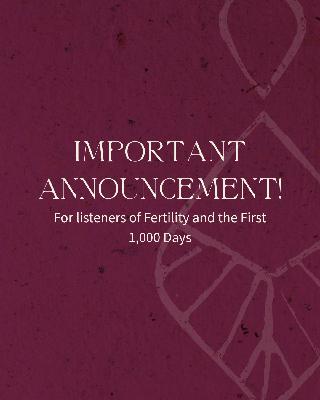Ep74 - The Micronutrients Series - Macro Minerals Pt3
Description
Today, Katy discusses the minerals potassium and sodium, with regard to their utmost important functions in the body. Whilst these minerals may not directly be linked to fertility, you'll find out why they are so important for everyone to be thinking about, as well as the reason they are so imbalanced in the modern Western diet.
Hello, you are listening to Katy Bradbury, a registered nurse and nutritional therapist. Today's podcast episode is called the micronutrient series, macro minerals, part three.
So that is a bit of a mouthful, the micros and the macros. And it has been a little while since I released an episode. I did mention in the last episode, why some of my podcast recordings have been a little bit more sporadic recently. And it's a lot of it is around perhaps wanting to switch things up a little bit. Now just to give you a little update on where I'm at with that, because I've been getting my thinking cap on for the last few weeks about how I might best address this because I don't want to have fallen out of love with my podcast, you know, this is a passion project, for me. It's something that my listeners really value. And so I've been trying to get my head around the best ways that I can serve you as my listener using this podcast as a platform, whilst also meeting my own needs, frankly, and keeping it as something that I actually really enjoy doing. And I look forward to doing it. So I will come and talk to you probably in the next episode about some of my thoughts around that. But for today, I wanted to just continue and finish off within the micronutrient series that I've been doing. So back earlier, in the summer, I decided that actually it probably be really helpful to talk about some of the micronutrients in a little bit more detail as to their importance for health and well-being and particularly of course, around fertility. So I have been doing that and I've covered the vitamins so far. So if you are a new listener, or you're a regular listener, although my episodes haven't been regular recently, if you are a devout listener, I should say then you might want to go back and just revise some of those because some of those particularly the vitamins that we've been through so far, is really really important to understand in the context of reproductive health. So do go back and give those a listen. But I wanted to cover today the last in macro minerals, if you like which are, I guess four of the main minerals that our body uses. Now, I covered in the last two episodes, magnesium super duper important mineral and as I said in that episode, magnesium is probably the most nutritional therapy if you ask them what their favourite mineral is, and yes, that is a valid question. Most would probably start spouting off about magnesium because it is just such an important nutrient. But today, I wanted to talk to you about two together. And I did talk about calcium, of course last, last episode as well. So do go back and listen to those. But today I'm going to cover sodium and potassium in one go. And that's because it's very difficult to talk about one without the other. And what I think you'll probably learn from this episode, and it's going to be a fairly quick episode actually because the sodium I know that most people are listening to this because they're really keen to hear about the way things might impact their fertility and their reproductive health. Now, there are not really links as such around sodium and potassium directly to fertility. But they are essential, essential minerals for human health. And they are essential because they are involved intricately or inextricably, I should say, in homeostasis. And homeostasis is really the narrow balance that our body needs to be in, in order to stay alive. And so you know, with that in mind, it is, it is important to all aspects of our health. So I'm just going to briefly give a summary today about sodium and potassium and how we might be able to think of them in the context of our health and our diet. So sodium, first of all, is essentially salt, so sodium and chloride together, equal salt.
And so is one of those things that has had a bit of a bad rap over the years. And it's been, it's hard to the finger pointed at it for, you know, risks of hypertension, which is high blood pressure and cardiovascular disease. So we're going to talk about sodium and potassium today in the context of blood, high blood pressure and cardiovascular disease risk because it's a really important one to understand. And this might be ringing bells for you, if perhaps if you have high blood pressure or cardiovascular disease running in your family, and it might be ringing bells for you if you've had genetic testing done. And some of the genes have come up for you, which puts you at higher risk of some of those. It might be that you have had a previous pregnancy, where you had issues come up with your blood pressure or had something like pre-eclampsia during pregnancy. And so that might be why alarm bells come up for you at the mention of blood pressure. Um, but sodium is it's an electrolyte. And so what that means and there are other minerals that are electrolytes too, potassium is one of the other major ones. But magnesium and some of the other ones that I have spoken about, and will talk about are also electrolytes. But typically speaking, we talk about sodium and potassium as being some of the key electrolytes in the body. And what electrolyte means is that it has an electric charge, guess what? our bodies need electrical charges, in order to function because we need to be able to create energy. And you know, our hearts, for example, our heart conduction requires electricity, you know it, it requires an electrical charge, in order for it to actually beat. So. So as i say really, really important just in this context of staying alive and maintaining homeostasis. So sodium is an electrolyte it has this electrical charge, and sodium and potassium have this electrical charge at a cellular level. And so every single cell in our bodies has got pumps, essentially. So, so pumps on in and out of the cell, that are designed purely for managing the traffic of sodium and potassium in and out of the cell. Because sodium is mostly supposed to be outside of the cell, and potassium is mostly supposed to be inside of the cell, sometimes they can get muddled up and that balance can get shifted in the wrong direction. So these pumps have to work hard to make sure all the time, that they are in the right place so that they're not causing havoc, because that would be dangerous. So this is what's happening at a cellular level all the time. Now sodium is also linked with fluid balance. And so sodium is connected with our kidneys and our renal function. And it's involved in our ability to wee. And you might, you know, weeing might just seem so fundamental, such a kind of everyday occurrence that you don't really think about. But again, it's an essential part of our health, not just because it's excreting things that we don't want to be in our body anymore. It's one of the modes of excretion alongside pooing and sweating and various other things, but it's and breathing, but it's also maintaining that, that really important fluid balance in the body. So blood pressure and fluid balance, again, are inextricably connected because our blood pressure is, our blood is fluid, right? And so the pressure of our blood in our body needs to be maintained by sodium and also by potassium.
So sodium, as I say, does get a bit of a bad rap for being responsible you know there's again a massive drive perhaps in the 70s. As this science emerged in the connection between sodium and blood pressure emerged around having high blood pressure and having cardiovascular disease and a high salt diet. So lots of people went full pelt the other way. And this is the same with fat. And this is one of the things that I talk about a lot is the fat piece, we're not going to go into that today. But this kind of this notion that all fat is bad, it's complete rubbish. But that's, that's a topic for another day. But salt got a bad rap because of this association. And so then lots of people ran, you know, the other way, and it's low salt, this low salt that must include salt in my diet. But again, guess what? Salt is really important. So then subsequently, there is a bunch of research that came out, that showed that actually people who had like, low salt in their urine, because that's a marker of seeing how much salt is in the body. Were also at risk of these cardiovascular events and cardiovascular disease and hypertension. So just like with everything else, and I feel like a bit of a broken record here, it has to be in the right balance. So salt, if we think about the typical Western diet, I guess, the take home message here, and I'm not going to start talking about how many milligrammes of salt you should be having, because actually, I think that that kind of information can be really unhelpful. And what that does is adhere to this one size fits all approach for health, which actually just, it just is simply not true. Essentially, I guess what my advice would be to you, if you did want to consider this is just this notion that most people in the Western world, the majority of the salt, the majority of their sodium intake, comes from refined and processed foods, right. And refined and processed foods are laden with refined salt, which is also full of loads of additives and undesirable things. So most people in the Western world would benefit from significantly reducing the amount of processed foods that they're eating. And then so if you move away from processed foods, and move towards whole home cooked foods, then you're naturally going to be drastically reducing your sodium intake, at which point, you can safely be includi

















